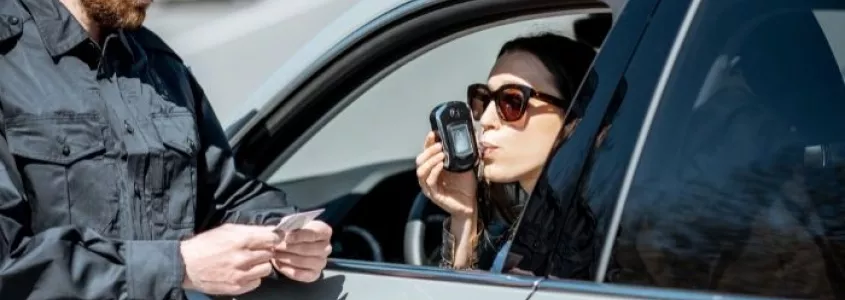
Table of contents
Many people think it's OK to have a couple of drinks and then drive home. However, it is a real danger for many reasons. In fact, there are times when the best thing that can happen is to be stopped at a roadblock. Just look at the number of alcohol-related road accidents per year.
However, some people do not learn from this experience and commit a drink-driving offence again. But what happens and what are the consequences? Here we explain.
What is a drink-driving offence?
There are two types of drink-driving offences. The first is administrative. It occurs when an authority stops a driver and gives a value of between 0.25 and 0.59 mg of alcohol per litre of exhaled air or between 0.50 and 1.19 grams of alcohol per litre of blood. In this case, the case of a repeat offence does not exist.
A different situation arises if the driver exceeds the maximum limits mentioned above. That is to say, he/she gets behind the wheel with more than 0.6 mg of alcohol per litre of exhaled air or 1.2 grams of alcohol per litre of blood. In this case, we are dealing with a criminal offence of drink-driving, which is severely punished by law.
So what does it mean to be a repeat offender?
To answer this question we must turn to Article 22.8 of the Penal Code. It specifies that, when a person commits an offence and is convicted, if he or she repeats an offence of the same nature, he or she may suffer an aggravating circumstance due to recidivism.
Applied to the case in question, a repeat offender would be a person who, after having driven with a blood alcohol content exceeding the above-mentioned limits, is arrested again for the same offence.
However, in order for the aggravating circumstance of recidivism to apply, the following requirements must also be met:
Having been previously convicted of an offence against road safety.
The new offence must be of the same nature as the previous offence for which the driver was convicted (in this case, exceeding 0.6 mg of alcohol per litre of exhaled air or 1.2 grams of alcohol per litre of blood).
The criminal record for the first drink-driving offence must still be valid. If the statute of limitations has expired, it will not be considered a repeat offence.
What are the consequences of the aggravating circumstance of repeat drink-driving offences?
To understand them, it is essential to take a look at Article 379.2 of the Penal Code, which defines the offence of drink-driving (also encompasses the act of driving a motor vehicle under the influence of intoxicating drugs, psychotropic substances and narcotics). It carries the following penalties:
3 to 6 months' imprisonment or, failing that, a fine of 6 to 12 months.
community service for a period of between 30 and 91 days.
Deprivation of driving licence for a period of between 1 and 4 years.
As we said before, recidivism is understood as an aggravating circumstance in the Penal Code. Therefore, in the light of the above penalties and the provisions of Article 66, the result would be as follows:
If there is only one aggravating circumstance or only one or two repeat offences, the penalties should be applied in the upper half of the sentence. That is, between 4.5 and 6 months' imprisonment or between 9 and 12 months' fine, community service of between 60 and 91 days and withdrawal of the driving licence for between 60 and 91 days.
If the offence has been repeated three times in the past. The judge will have the power to apply the higher penalty or, in other words, 6 months in prison or 12 months in prison, 91 days of community service and 4 years of driving licence withdrawal for repeat drink-driving offences.
I am a repeat offender: can I go to prison?
Yes, it is entirely possible. However, given the variety of penalties for drink-driving, this is not usually the case. Unless, of course, you have caused death or particularly serious injury to pedestrians or other drivers. The same applies if you have a previous prison sentence of less than 2 years and it has been suspended.
In short, drinking and driving is a bad decision that can have very serious consequences. And if you do it more than once and are caught by the authorities, even more so. We hope that, with what we have said here, we have dissuaded our readers from getting behind the wheel if they have previously tried alcohol.

"Anywhere in Spain"
With our online appointment system you will have immediate advice without the need for face-to-face visits or travel.
One of our lawyers specialized in your area of interest will contact you to formalize an appointment and make your consultation by video call.
